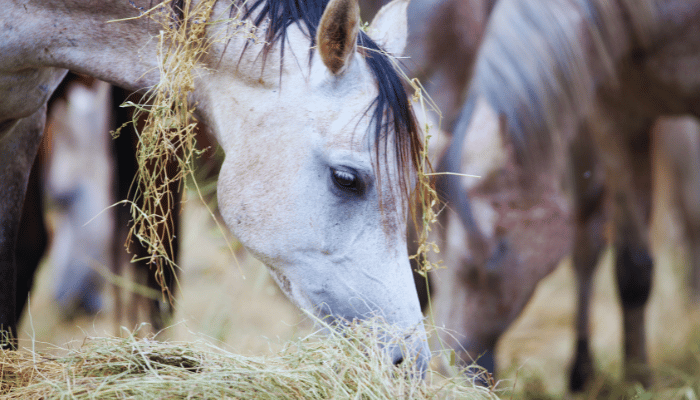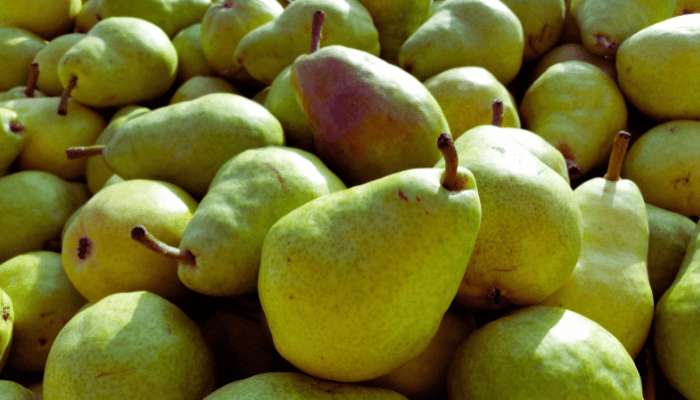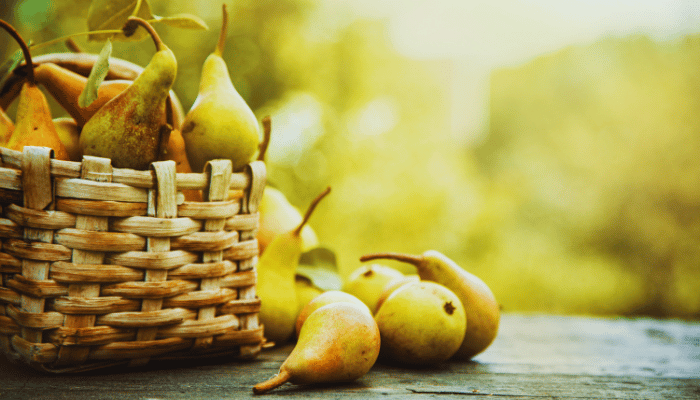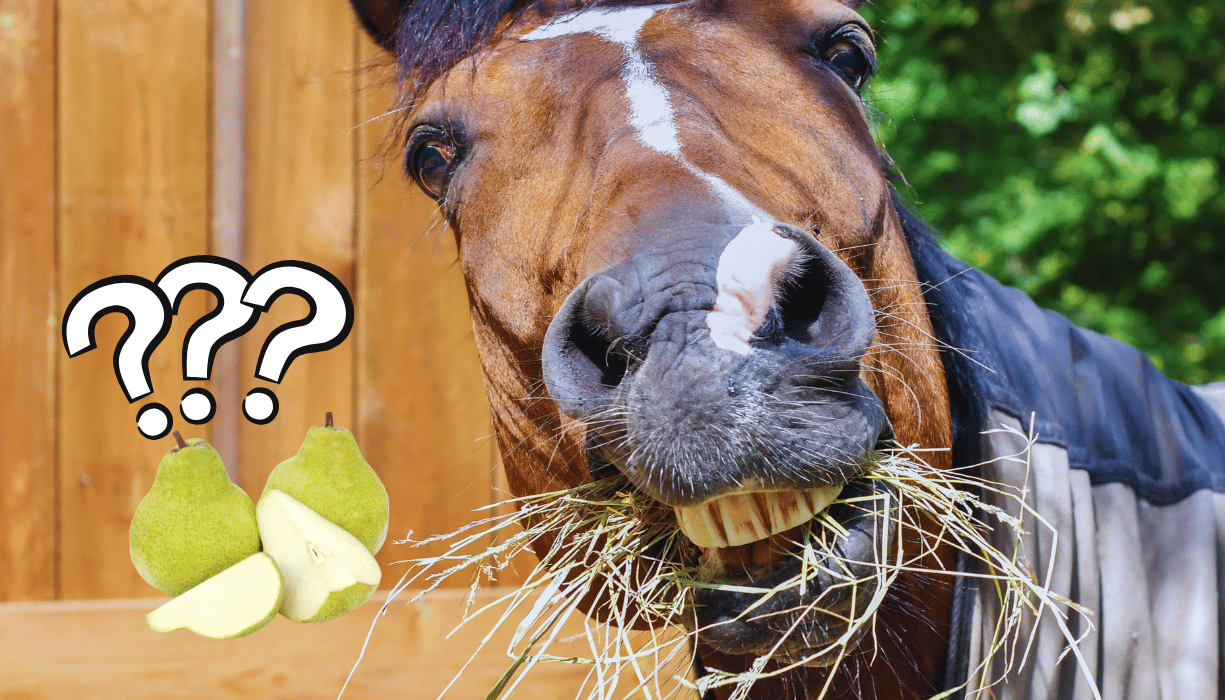Your horse’s diet is the cornerstone of its health and vitality, but there’s a pressing question lingering in many equestrian minds: Can Horses Eat Pears? As a horse owner, you may strive to enrich your equine companion’s nutrition with natural treats. Yet, the world of fruits is a minefield of uncertainty, where sweetness can sometimes mask danger. Offering the wrong treat can lead to digestive distress or even toxicity.
Here’s the good news: pears might just be the juicy, fiber-rich reward your horse will relish, but only if prepared correctly. In this guide, we’ll peel back the layers of confusion and explore the safe feeding practices for this beloved fruit. Get ready to discover how to turn pears into a delightful addition to your horse’s diet without compromising its health.
Feeding Horses Pears
Nutritional Benefits of Pears
Pears are a delightful and nutritious treat for horses. These fruits are rich in essential vitamins and minerals that contribute to a horse’s overall health.
Vitamins and Minerals: Pears offer a range of vitamins and minerals, including Vitamin C and K, potassium, magnesium, and copper. Vitamin C supports the immune system, while Vitamin K aids in blood clotting. Minerals like potassium, magnesium, and copper are essential for various bodily functions.
Fiber Content: Pears are high in fiber, containing roughly 6 grams in a medium-sized pear, which aids the horse’s digestive system and promotes proper nutrient absorption. The fiber in pears can also help with digestive health by keeping the gastrointestinal tract functioning smoothly.
Antioxidants: Pears contain beneficial antioxidants like procyanidin and quercetin. These antioxidants can enhance heart health by reducing inflammation and increasing good cholesterol levels. Antioxidants play a vital role in neutralizing free radicals, thus protecting cells from damage.
Hydration: With a high water content, pears are particularly hydrating, making them an excellent snack especially during hot weather.
Risks of Feeding Pears

Despite the benefits, there are some risks associated with feeding pears to horses that need to be carefully considered.
Sugar Content: Pears contain natural sugars, and when fed in large quantities, these sugars can lead to weight gain and dental issues in horses. Horses with insulin resistance or those prone to laminitis should have their pear intake carefully monitored.
Portion Control: Overfeeding pears can disrupt the horse’s balanced diet. It’s crucial to feed them in moderation to avoid gastrointestinal upsets or imbalances in their dietary regimen.
Pesticides and Toxins: It’s important to wash pears thoroughly or choose organic options to avoid pesticide residues which could be harmful.
By understanding the nutritional benefits and potential risks, horse owners can make informed decisions about including pears in their horse’s diet. For more information on balanced diets and incorporating fruits, visit our article on the importance of a balanced diet for horses.
Moderation and Frequency
When incorporating pears into your horse’s diet, it is essential to adhere to moderation and established guidelines to prevent any health issues related to sugar content.
Recommended Amounts
While pears can be a tasty and nutritious treat for horses, it’s crucial to offer them in appropriate quantities to maintain a balanced diet. Excessive consumption of sugary fruits can lead to digestive issues and other health concerns.
According to Strathorn Farm, horses can safely consume up to two pounds of pears twice a week. Alternatively, a chopped medium-sized pear can be given as a small daily treat.
| Pear Amount | Frequency |
|---|---|
| 1-2 small slices | A few times a week |
| Chopped medium-sized pear | Daily |
| Up to 2 pounds | Twice a week |
Frequency Guidelines
Feeding frequency is just as critical as portion control in safeguarding your horse’s health. The goal is to ensure that your horse enjoys the benefits of pears without encountering any adverse effects.
The Equine Institute recommends feeding horses pears in moderation, limiting the amount to 1-2 small slices a few times a week. This practice helps manage the intake of natural sugars found in pears.
Following these frequency guidelines can help you maintain a balanced diet for your horse:
- Offer pears a few times a week, not daily.
- If opting for larger amounts, ensure it’s no more than twice a week.
- For small, daily treats, keep the quantity minimal (e.g., one medium-sized pear).
By adhering to these recommendations, you can incorporate pears into your horse’s diet in a way that promotes health and satisfaction. For more dietary tips and fruit options for horses, check out our articles on can horses eat bananas and can horses eat watermelon. Keeping moderation and frequency in mind ensures that your horse reaps the benefits of pears while staying healthy and happy.
Safety Tips for Feeding

Preparation and Cutting
When feeding pears to your horse, proper preparation is essential to ensure safety. Here are a few guidelines to follow:
- Wash Thoroughly: Begin by thoroughly washing the pears to eliminate any pesticides or chemicals that might be harmful to your horse’s health.
- Cut into Small Pieces: Always cut the pears into small, manageable pieces. This helps to prevent choking hazards and makes it easier for your horse to chew and digest the fruit.
- Remove Seeds and Core: It’s crucial to remove the seeds and core from the pear as they could be a choking hazard for your horse. Additionally, seeds may contain small amounts of harmful substances.
Monitoring Reactions
After introducing pears into your horse’s diet, it’s important to monitor their reactions. Here are some points to consider:
- Observe Initial Reactions: Pay close attention to your horse the first time they eat pears. Look for any signs of discomfort, allergic reactions, or digestive issues after consuming the fruit.
- Monitor Digestive Health: Any changes in behavior, stool consistency, or overall health should be noted. If you observe any adverse effects, discontinue feeding pears and consult your veterinarian.
- Gradual Introduction: Introduce pears gradually into your horse’s diet. Start with small amounts and gradually increase if there are no negative reactions.
For more detailed information on other fruits suitable for horses, you can explore articles like can horses eat watermelon or can horses eat bananas.
By following these safety tips, you can ensure that feeding pears remains a healthy treat for your horse.
Supplementing Horse Diet

Balanced Diet Importance
Ensuring a horse’s diet is well-rounded is essential for its overall health and well-being. Pears offer a range of vitamins, minerals, and fiber beneficial for horses, such as Vitamin C, which aids the immune system, Vitamin K vital for blood clotting, and minerals like potassium, magnesium, and copper crucial for various bodily functions.
Horses are generally fed a blend of hay or pasture along with a grain mix to meet their nutritional needs. The choice of feed depends on several factors, including the horse’s specific requirements, the availability of pasture, prepared feeds, traditional feeding practices, and management (Oklahoma State University Extension).
Incorporating Fruits Moderately
Although pears can be a healthy addition to a horse’s diet, it is important to feed them in moderation. Pears contain natural sugars, which can lead to weight gain and metabolic issues if consumed in excess.
For a well-balanced diet, it’s crucial to incorporate fruits like pears in limited quantities. Consulting a veterinarian is essential for tailored advice on feeding pears to horses, taking into account their health, activity level, and nutritional needs (The Equine Institute).
Fruits can be a splendid supplement to a horse’s diet, but balance and moderation are key. For more information on feeding horses various fruits, explore our articles on can horses eat bananas, can horses eat watermelon, and can horses eat apples.

